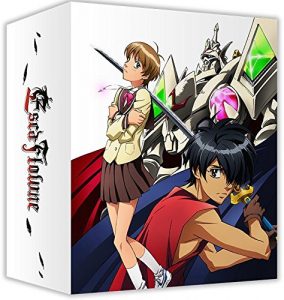
(Neo, Uncooked Media – I also add further observations in an article on the AllTheAnime website.)
Schoolgirl Hitomi is whisked to Gaea, where there be dragons, princesses, cat-girls and a war waged by an enemy fixated on fate. Protected by two very different men, Hitomi seems a helpless damsel, but her powers of prophecy will decide Gaea’s destiny.
For readers wondering if Escaflowne holds up in 2016: yes, absolutely. It’s supremely well-made by today’s standards as well as 1996’s: a stellar spectacle, a compelling adventure, and a splendid character ensemble to embrace as old friends. These characters travel to many nations, their adventures enlivened by passionate love triangles and rivalries, and manipulated by their foe’s experiments in a fantasy version of quantum physics (small wonder director Kazuki Akane went on to make Noein).
Heroine Hitomi, the girl from Earth, is a strong character who doesn’t need to tell us she’s strong. As a teen, she’s also silly, soppy and funny. There are two new youths in her life: the angry, fearful, exiled prince Van, whose uncertain swordplay says everything about the state of his manhood, and the elegant knight Allen, who knows where mad romantic adventures end up. Esca’s characters rely on chemistry more than depth. The series keeps them together rather than send them on separate tracks, the better to relish their rivalries and reconciliations.
The presentation is lush, exuberant. Perhaps the high-school scenes in part one are dated now, but once a bellowing dragon materialises on the playing field and Hitomi is raptured to Gaea by a column of light and Gregorian chants, then it’s gorgeously immersive for the next ten hours. If it’s not Ghibli-level, then Esca is comparable to contemporary video series like the original Tenchi Muyo and El Hazard, though with the goofing toned well down. This is a fantasy with (good) jokes, not a jokey fantasy.
The classically-styled music, by Yoko Kanno and her then-husband Hajime Mizoguchi, is still extraordinary, with tracks such as Kanno’s sublime “Arcadia” with its Latin aria, and Mizugochi’s transcendently wistful theme for Hitomi.
Esca’s last few episodes skimp on explanation and motivation – enough to mar the series on first viewing, though they make an approximate kind of sense on rewatching. This edition also includes Escaflowne The Movie, a glummer, gorier retelling with new designs (in Star Trek terms, it’s a ‘Mirror Universe’ story). The film has some audio-visual rewards, but its story is chronically humourless and unengaging.
[amazon_link asins=’B01N34MMN9,B005F7J7D4′ template=’ProductGrid’ store=’anime04c-21′ marketplace=’UK’ link_id=’6def1f9b-d197-433f-b480-17c40beda1bd’]